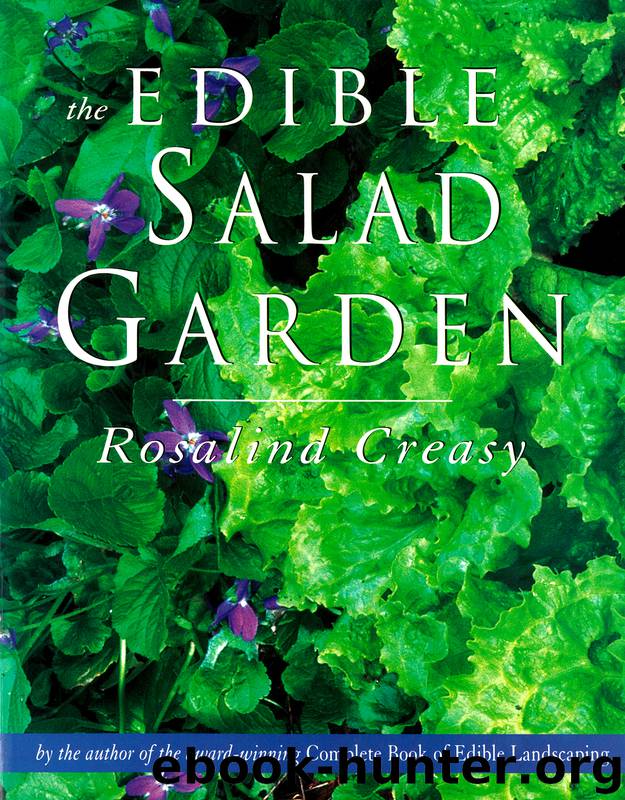Edible Salad Garden by Creasy Rosalind;

Author:Creasy,Rosalind;
Language: eng
Format: epub
ISBN: 2197487
Publisher: Tuttle Publishing
Oils
Oils are used in salads to coat the greens and carry the flavorings. They add richness and, in many cases, their own flavors. Many different kinds of oils are used in salads; they range from the heavy, fruity olive oil to the light, almost neutral safflower oil. While the choice of an oil is basically a matter of taste, the olive oils and some of the nut oils are most often used on strong-flavored greens. For everyday salads the lighter oils are the most versatile. Whatever your choice, try to buy cold-pressed oils (check the label), which means they have not been heated and are consistently of high quality. Heating can destroy some of the vitamins in an oil. Store oil in a cool place.
Olive oils: There are many informal grades of olive oil. They range from “extra-virgin” (first cold pressing) and pure virgin to pure and fine. Though the latter sound distinctive, olive oils in these categories often have a lighter and sometimes off taste. Generally, the extra-virgin and pure virgin olive oils have been cold-pressed and the oil poured off, the pure and fine oils are sometimes made from imperfect olives, and/or are extracted by boiling or chemical means. Oils of higher quality are generally green in color and have varying flavors. You’ll need to taste many different kinds to determine your own flavor preferences.
Salad oils: The so-called salad or vegetable oils available in the market are quite tasteless, adding only a slippery quality to your salad at best and an off taste at worst. However, the light-tasting ones like safflower, corn, and canola oils available at natural-food stores have a light, clear flavor. They can be used with some of the lighter-flavored greens and combine nicely with the nut or olive oils in varying amounts to taste and take added flavoring (as with chilies, garlic, or herbs) very well.
Nut oils: Many oils are made from nuts, including walnut, almond, sunflower seed, and hazelnut oils, and they are usually pressed in the fall and are best used very fresh. These oils are elegant with some of the hardier greens or with mâche, where their nutty flavors really come through. Walnut oil is particularly nice with bitter salad greens or combined with raspberry vinegar and served over a mixed lettuce salad. Or try it with some lemon juice in a spinach salad. The hazelnut and almond oils are particularly nice with avocados and with spinach. For all the nut oils, the taste is heightened by garnishing the salad with a few roasted nuts.
Download
This site does not store any files on its server. We only index and link to content provided by other sites. Please contact the content providers to delete copyright contents if any and email us, we'll remove relevant links or contents immediately.
Turbulence by E. J. Noyes(8040)
The Thirst by Nesbo Jo(6924)
Gerald's Game by Stephen King(4640)
Be in a Treehouse by Pete Nelson(4032)
Marijuana Grower's Handbook by Ed Rosenthal(3675)
The Sprouting Book by Ann Wigmore(3583)
The Red Files by Lee Winter(3411)
The Remains of the Day by Kazuo Ishiguro(3390)
Sharp Objects: A Novel by Gillian Flynn(3004)
Organic Mushroom Farming and Mycoremediation by Tradd Cotter(2684)
Christian (The Protectors Book 1) by L. Ann Marie(2682)
The Culinary Herbal by Susan Belsinger(2477)
Stone Building by Kevin Gardner(2389)
The Starter Garden Handbook by Alice Mary Alvrez(2331)
Lilac Girls by Martha Hall Kelly(2298)
The Unlikely Pilgrimage of Harold Fry by Rachel Joyce(2262)
The Lean Farm Guide to Growing Vegetables: More In-Depth Lean Techniques for Efficient Organic Production by Ben Hartman(2125)
Urban Farming by Thomas Fox(2101)
Backyard Woodland by Josh VanBrakle(1924)
